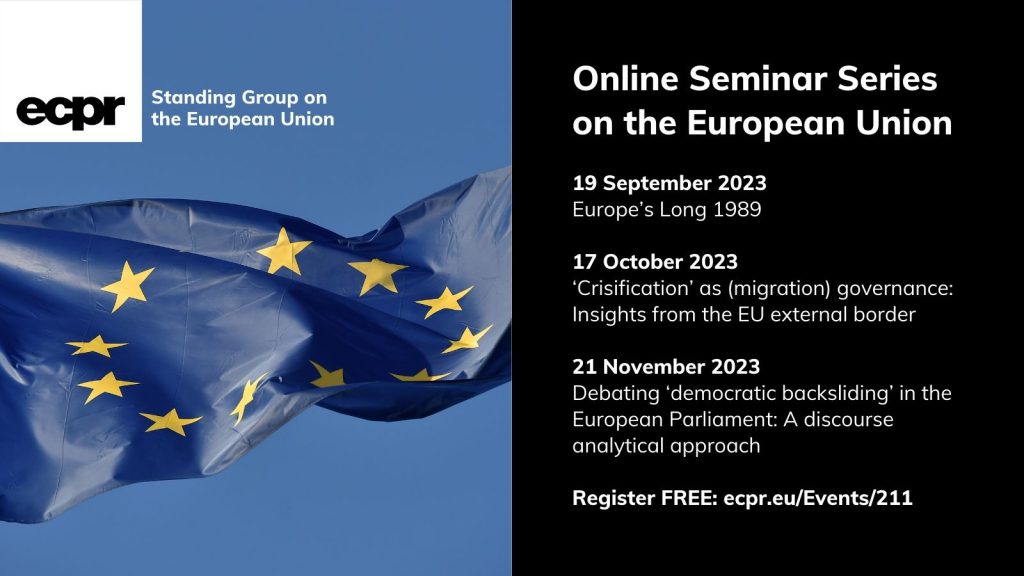SGEU Online Seminar Series 2023/2024
The Standing Group on the EU (SGEU) of the European Consortium for Political Research (ECPR) is glad to invite you to its first online seminar of the 2023/2024 academic year on Tuesday 17 October 2023.
Convened and chaired by Professor Jonathan Zeitlin (University of Amsterdam) and Professor Nathalie Brack (Université libre de Bruxelles), the seminar takes place online each third Tuesday of the month from September through April and allows researchers to present their work and get feedback from a discussant and a multidisciplinary audience. The seminar series is open to anyone interested, who must register for free through the ECPR website here. Participants will need a free MyECPR account to register.
The next seminar of the series will take place on Tuesday 17 October, 16:00 – 17:30 CEST / 15:00 – 16:30 BST.
Details on the seminar and the speakers follow below. We hope to see many of you there!

“Crisification” as (Migration) Governance: Insights from the EU External Border
Tuesday 17 October, 16:00 – 17:30 CEST / 15:00 – 16:30 BST
This paper will uncover how ‘crisification’ has permeated the EU migration and external borders acquis (and led to its securitisation) becoming a system of governance in its own right. The speaker will argue that the externalisation, violence, and coercion, characteristic of EU border controls, is a consequence of ‘crisification’, which produces very distinct corroding effects on the legal protections of refugees and migrants.
Drawing on the EU-Turkey Statement and the reaction to the 2021 Belarus ‘crisis’ as illustrations, the speakers main contention is that the presentation of migration and asylum events as ‘crises’ has been utilised in the EU not only to justify measures and practices outside the bounds of ‘normal’ politics but that it has also targeted and fundamentally transformed the law as well, allowing for legalised expansions of power and for contractions of pre-existing legal safeguards, leading to the re-configuration of the EU legal order in this field.
The paper will demonstrate how invocations of ‘crisis’ enable the normalisation of legal and policy developments at odds with basic principles and international standards.
Two complementary phenomena demonstrate the impact of ‘crisification’ on the borders/migration law system: The ‘softification’ of existing hard law obligations, on the one hand, which translates into the lowering (or negation) of the individual’s legal safeguards, and the progressive hardening – or ‘lawification’ – of means and practices previously considered unacceptable, on the other hand. These two poles (the ‘softification’ of existing hard-law protections and the ‘lawification’ of violations) constitute the extremes of a continuum that is nurtured, enabled, and expanded by ‘crisification’ as a mode of governance. The final effect is an erosion of the existing standards that fundamentally transforms (and disfigures) the EU legal and policy framework regarding access control and border surveillance.
Speaker: Violeta Moreno-Lax, Queen Mary University
Violeta Moreno-Lax is Professor of Law at Queen Mary University of London, where she has founded and directs the (B)OrderS Centre for the Study of Borders, Migration, and Mobility. She currently holds a Ramón y Cajal Senior Research Fellowship at the University of Barcelona, where she is conducting research on the criminalisation of solidarity and migration.
Since 2017, she has been Visiting Professor at the College of Europe, where she teaches a course on the EU’s Area of Freedom, Security and Justice. She also serves as Co-Chair of The European Law Observatory; as a member of the Advisory Board of Equal Rights Beyond Borders; as a member of the Steering Committee of the Migration and Law Network; and has been Senior Research Associate of the Refugee Law Initiative since 2018.
As an internationally recognised expert in EU and international refugee and migration law at the intersection with security and border violence, she regularly consults for the EU institutions and other organisations worldwide.
Discussant: Nick Vaughan-Williams, University of Warwick
Nick Vaughan-Williams FAcSS is Vice-Provost and Chair of the Faculty of Social SciencesLink opens in a new window at the University of Warwick. He is Professor of International Security in the Department of Politics and International Studies (PAIS).
His programme of research focuses on the international politics of borders, migration, and security and his findings have been presented to the EU Commission, Frontex, the UK Cabinet Office, the UK Foreign, Commonwealth & Development Office, the UK Home Office, and the Maltese Presidency

